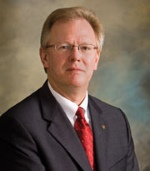Union bosses take big bucks from boilermakers

By Jason Hart | Watchdog.org
Three International Brotherhood of Boilermakers officers were paid more than $500,000 during the union’s fiscal year ending June 30.
International Brotherhood of Boilermakers President Newton Jones
Including gross salaries and other disbursements reported to the U.S. Department of Labor, IBB International Vice President Ed Power was paid $697,714. President Newton Jones was paid $639,034, and international vice president Joseph Maloney was paid $501,392.
A total of 61 officers and employees in IBB’s Kansas City, Kan., international headquarters were paid $100,000 or more; 19 were paid more than $200,000, and nine were paid in excess of $350,000.
IBB officers and employees are paid with money taken from workers across the United States and Canada. In addition to lobbying against free trade and in favor of government spending, IBB warns members to beware Big Labor’s critics.
“Our opponents are targeting our very right to exist,” Jones wrote in a 2013 manual for the IBB Legislative Education Action Program. “The hypocrisy of their arguments defies logic.”
“The insincerity of their beliefs is only exceeded by the deceit of their words and the greed of their actions,” Jones wrote, adding, “Our agenda is you and the economic well-being of your family. THIS IS A TIME FOR ALL BOILERMAKERS — ALL WORKERS — TO STICK TOGETHER.”
A “War on Workers” section of IBB’s website contains news stories attacking right-to-work laws, federal budget cuts and Wisconsin Gov. Scott Walker. Right to work allows employees in unionized workplaces to choose whether to pay union bosses.
Jones was paid a gross salary of $388,708 during IBB’s 2014 fiscal year, while Power’s gross salary was $552,964. If IBB stands with its members — the average wage for a boilermaker in America is $57,920, according to the Bureau of Labor Statistics — who decides to pay union leaders so much?
“In our union, as in most, International officer salaries are set during convention (held once every five years) by a vote of the delegates from across the United States and Canada who represent the membership of our affiliate local lodges,” IBB communications director Mike Linderer explained in an email to Watchdog.org.
“These delegates vote during the convention on officer salaries and on any increases during the course of the ensuing five years. They are empowered to debate and challenge any law committee proposals and offer counterproposals if they so choose,” Linderer added. “The law committee is even made up of a subset of those same convention delegates to the convention.”
IBB officers are among the highest-paid union bosses on the planet even though the union’s membership numbers pale in comparison to larger AFL-CIO affiliates.
Compensation for officers and employees at IBB headquarters totaled $15,749,989, the equivalent of $287.47 a year from each of the union’s 54,789 members.
Based on gross salary disbursements, officers and employees of IBB were paid an average of $109,551 during the union’s 2014 fiscal year. Including all disbursements from the union, IBB officers and employees were paid an average of $148,585.
“The Department of Labor requires extensive financial reporting from labor unions (considerably more demanding than what is required of corporations for their shareholders to review),” Linderer wrote. “Unfortunately, the Labor-Management (LM) reports are often misinterpreted by those who read them, whether through ignorance or malice, inflating actual salaries by combining them with business expenses.”
“Consider a reporter’s air flight and hotel expenses: Would you consider them salary or even income? In our case, they are construed as part of the ‘total compensation.’ This, unfortunately, ends up as a twisting of words and facts by reporters for their ‘news’ reporting agenda.”
AFL-CIO President Richard Trumka, whose compensation comes from IBB and other unions in the AFL-CIO coalition, was paid a total of $332,131 in the past year. Although IBB’s membership accounts for less than one half of one percent of AFL-CIO’s, eight IBB officers and one IBB employee were paid more than Trumka in 2014.
Power and Jones were each paid more than twice as much as Trumka. Asked about the disparity, Linderer pointed to the compensation of CEOs.
“As for the compensation comparison with President Trumka, I simply point you to the compensation of so many multi-millionaire, multi-billionaire CEOs, some serving in Congress, compared to the paltry few hundred thousand dollars a year paid to our United States President, as long as you are looking for comparisons,” Linderer told Watchdog.org.
The average American CEO is paid $178,400, a recent Wall Street Journal study found.







